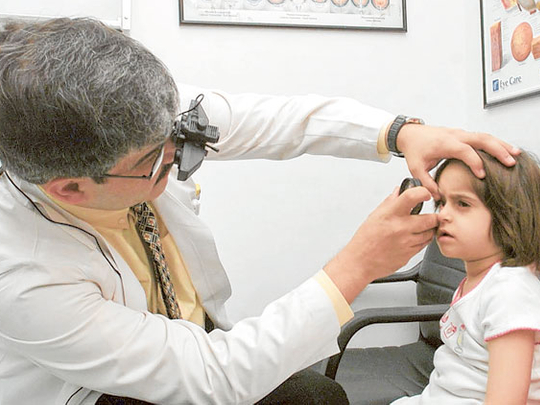
Abu Dhabi: A number of preventive measures to help residents protect themselves from debilitating health conditions and injuries have this year dominated the activities of health authorities in the emirate of Abu Dhabi.
Led by the Health Authority Abu Dhabi (HAAD), health care facilities have been offering a number of different screenings to check for diseases among young children.
In addition, the emirate has also witnessed the introduction, as well as enforcement, of new regulations to improve health care standards.
One of the most important of these initiatives saw 13 newborn babies saved from critical congenital heart disease by June 2012.
Screening for the disease, a fatal condition that can kill babies in the first two months after birth, was made mandatory in 2011, and health care professionals have this year received training on how to administer it accurately.
A second screening programme also seeks to ensure that children below the age of six undergo regular medical checks and lead healthy lives.
The programme, which includes guidelines on monitoring children’s growth and development and titled ‘Well Child Visits’, will be fully implemented in hospitals from March 2013, HAAD officials told Gulf News.
At the same time, the emirate’s Weqaya programme is also ongoing. This screens Emirati adults over the age of 18 for cardiovascular disease risk factors such as blood pressure and blood sugar levels. The programme will produce the second wave of comprehensive data on Emirati health. Compared to the first wave of Weqaya data produced in 2008, this set of health indicators also includes items such as Vitamin D levels among the population.
In addition, this year has also seen the HAAD work to discourage smoking among residents. An anti-tobacco campaign launched in May saw the majority of mall cafes and restaurants ban the harmful habit within their premises.
Reporting diseases
Cancer is the third-leading cause of death in the emirate and the fight against different forms of the disease has this year been bolstered by an intensive awareness campaign.
The initiative, known as the Cancer Wave Health Promotion, provides information to residents about the most prevalent cancer forms in Abu Dhabi emirate, namely, breast cancer, colorectal cancer and cervical cancer.
Since October, health care facilities have also had to report any new cancer cases to the HAAD. Using these reports, the HAAD is working to create an emirate-wide cancer registry that can enable focused research on cancer incidence and prevalence.
According to details revealed in May, falls from heights and falling objects were the leading cause of death at work sites.
The HAAD therefore launched a campaign to reduce such incidents in the emirate, and also called upon workers and employers to implement appropriate safety measures at all work sites.
From next year, health care facilities must also report injury and poisoning cases to the HAAD.
These reports will be used to identify likely injury risks and ways of preventing them in the future, officials said.
And in a bid to improve health care standards across all facilities, the HAAD also barred hospitals from setting up operations in residential buildings.
The decision, which was issued in November, aims to ensure the safety of residents and reduce the spread of infections.
Seven popular private hospitals housed in residential buildings have been given five years to relocate, or absorb all units in the current buildings into their own premises.












